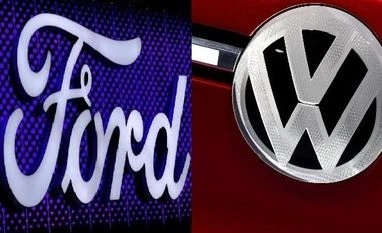Ford Motor Co and Volkswagen AG said they will spend billions of dollars to jointly develop electric and self-driving vehicles, deepening a global alliance to slash development and manufacturing costs. How soon those investments will pay for themselves is an open question across the global auto industry.
Ford and VW executives said the latest collaborations could save hundreds of millions of dollars for each company. But the projects will take time.
The transitions to electric and self-driving vehicles, as well as the production volumes, were uncertain, said Ford Automotive President Joe Hinrichs at a news briefing on Friday in New York. Because of that uncertainty, and spiralling costs, "we are going to see more collaborations" between automakers, Hinrichs said.
Ford and VW have already started cooperating in the area of commercial vehicles and mid-size pickup trucks as part of the auto industry's broader effort to redraw production and sales footprints to cope with more stringent regulation and fragmented markets.
VW will invest $2.6 billion in Argo AI, Ford's self-driving cars venture, and will buy $500 million worth of Argo shares from Ford, giving the two automakers equal stakes in the startup. Ford also will build an electric car in Europe using VW's MEB electric vehicle platform, the companies said.
"Our global alliance is beginning to demonstrate even greater promise, and we are continuing to look at other areas on which we might collaborate," VW's Chief Executive Herbert Diess said on Friday.
Ford expects to build more than 600,000 electric vehicles in Europe over six year starting in 2023, sourcing components and the vehicle underpinnings from VW, helping both to cut costs. Hinrichs said it would take four years to design Ford's electric car around VW's MEB architecture, and retool a Ford of Europe plant to build the vehicle.
More From This Section
VW said it had committed $7 billion to its MEB platform, which is expected to underpin 15 million vehicles worldwide from the VW group over the next decade.
Diess said Ford would pay VW "set by set" for the use of VW's electric vehicle components, and that revenue from those Ford vehicles over six years could reach $10 billion. Analysts at Citi said Ford's licensing of Volkswagen's MEB platform was a "transformational" step for both companies.
"It likely provides VW with an unassailable scale advantage," Citi analyst Angus Tweedie said in a note published on July 10.
The cooperation with VW on electric vehicles in Europe is part of Ford's previously disclosed $11.5 billion EV investment worldwide.
Hinrichs said the VW collaboration would not affect Ford's plans to launch two new electric vehicles in the United States, including a battery-powered version of the F-150 pickup and a new Mustang-inspired crossover vehicle that is expected to be called Mach E.
Suppliers familiar with Ford's plans say the No. 2 U.S. automaker is developing a broader portfolio of electric vehicles, most of them crossovers that will carry the Ford and Lincoln brands, for North America and China. Many of those models will be built on an updated version of Ford's C2 global compact platform, they said.
The broader Ford-VW alliance, which covers collaboration beyond joint investments in Argo AI, does not entail cross-ownership between the two companies.
Ford created Ford Autonomous Vehicles LLC in 2018, pledging to invest $4 billion until 2023 and has sought outside investors to help share the spiralling cost of developing autonomous vehicles.
Volkswagen will contribute its Autonomous Intelligent Driving (AID) company to Argo, which will boost the self-driving unit's employees to 700 from 500. The two automakers will use Argo's self-driving technology to develop their own individual vehicles. Ford CEO Jim Hackett said the automakers will share data generated from Argo's self-driving software.
)